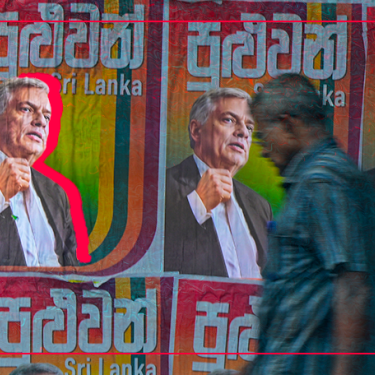From arbitrary arrests to censorship laws, Sri Lankan media professionals – particularly those from the Tamil minority – work in a precarious environment. Reporters Without Borders (RSF) is particularly alarmed by the worrying state of press freedom as Sri Lanka’s first presidential elections since the 2022 protests will take place on 21 September.
Since the beginning of 2024, at least two Sri Lankan journalists have been arrested due to their work. G.P. Nissanka, owner and editor-in-chief of news website Ravana Lanka, was arrested on 5 March at his home in the southern province of Sabaragamuwa. He remained behind bars until 20 March, due to his reporting on alleged corruption involving a high-ranking army officer. On 6 March, freelance journalist Bimal Ruhunage, accused of filming unauthorised street footage published on the Boston Lanka news website, was arrested in the Kurunegala region and remained in custody until 11 March.
Other journalists have been silenced through an anti-terrorism law known as the Prevention Terrorism Act (PTA), and the authorities recently acquired a new law that facilitates censorship: the Online Safety Act. Passed in January 2024, it gives extensive powers to a commission appointed by the president to assess “prohibited statements made online,” order their removal, and punish the perpetrators. Last year, the United Nations Human Rights Office warned that “many sections of the bill contain vaguely-defined terms and definitions of offences which leave significant room for arbitrary and subjective interpretation, and could potentially criminalise nearly all forms of legitimate expression.”
“RSF is carefully monitoring this pre-election period, a major democratic moment when journalists’ role of informing the public is particularly crucial. Most journalists, especially those from Tamil and Muslim minorities, censor themselves because their safety is not guaranteed. RSF calls on the presidential candidates to present an adequate plan to protect journalists and restore press freedom in Sri Lanka. In particular, they must commit to repealing the repressive Online Safety Act and Prevention of Terrorism Act (PTA), which are used against journalists.
Tamil journalists accused of terrorism
A report by the United Nations High Commissioner for Human Rights on fundamental rights in Sri Lanka since 2022, when police violently cracked down on peaceful protests, describes “a persistent trend of surveillance, intimidation and harassment of journalists and civil society actors, especially those working on enforced disappearances, land seizures, environmental issues, and with former combatants in Sri Lanka’s north and east.”
The report points out that the Prevention of Terrorism Act Act (PTA) is still “often used to arrest, detain and prosecute journalists.” Dileep Amuthan is the latest media professional to fall victim to this legislation: In November 2023, the journalist for the Tamil daily Uthayan was interrogated for four hours at the headquarters of the Counter-Terrorism Investigation Division (CTID), for an article published in 2020 on a Tamil remembrance day.
Tamil journalists are frequent victims of this type of judicial harassment. In September 2022, two Tamil reporters – Balasingham Krishnakumar, a freelance journalist and president of the Batticaloa District Tamil Journalists Association, and Selvakumar Nilanthan, an employee of the Tamil Guardian news website – were summoned to the CTID for suspected terrorism due to their alleged links with the Tamil Tigers, a Tamil separatist group involved in the civil war that devastated Sri Lanka from 1983 to 2009. In Nilanthan’s case, the summons was the latest in a series of interrogations dating to 2020. Journalist Murugupillai Kokulathasan was incarcerated for fifteen months, between November 2020 and March 2022, on similar terrorism charges.
Between 2023 and 2024, Sri Lanka dropped from 135th to 150th place out of 180 countries in RSF’s World Press Freedom Index.
source : rsf

